Why Now?
You are in your 40s, or perhaps early 50s. You’re creative, experienced, emotionally intelligent and compassionate. You have lived through so much, learned so much, and yet you still have so much you want to accomplish, so much you want to express in your world, career, relationships and community.
It could also be a time of great change in your personal and social environment. Kids growing up and leaving home. Relationships changing. New job, new ventures in life. Ageing relatives becoming more dependent. Loss and grief.
And now, of all times, you are being plagued with uncomfortable physical and mental symptoms: hot flashes, no energy, brain fog, mood swings and terrible sleep. If you have had any of these symptoms, you will know they are no joke, and can significantly affect your personal and work life, your sense of wellbeing and your physical and mental health.
I started experiencing perimenopausal changes in my mid-40s, and it was a turbulent few years as I learned how to manage the physical and emotional fluctuations.
Gradually, I realised that this time was an opportunity to leave behind limiting beliefs, expand my awareness and consciously choose how I would spend the rest of my life.
Using natural strategies of nutrition, movement and energy-balancing techniques, I learned to listen to my body and respond to my needs with accuracy and kindness.
All Women Go Through Menopause
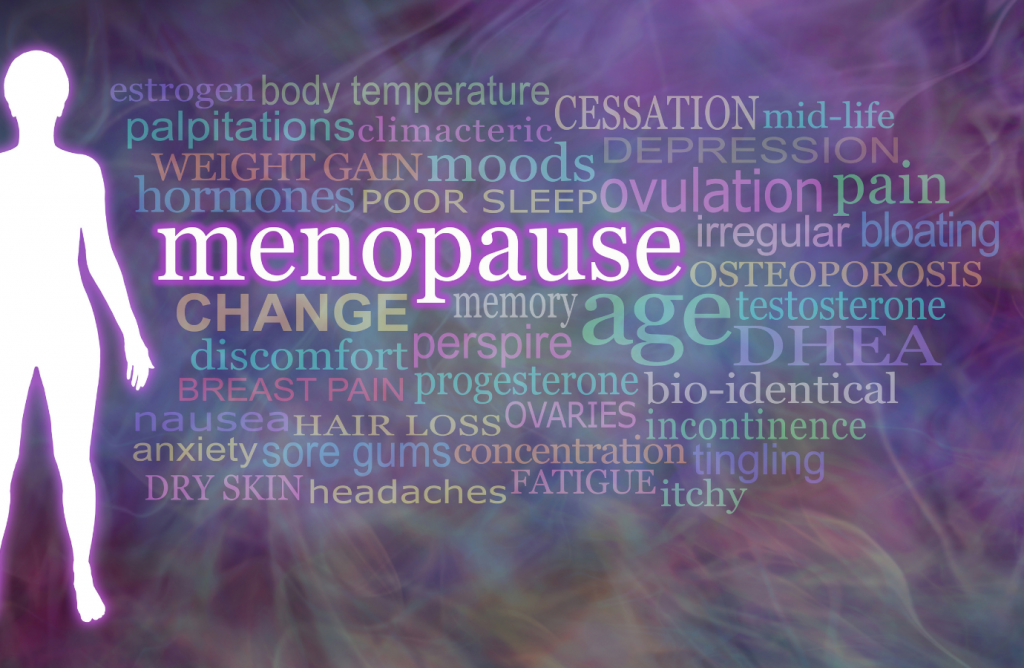
Menopause happens to all women. Sometimes earlier, sometimes later. As we are living longer, one third of our life may be post-menopause. With some of the symptoms of perimenopause starting in our 40s, it might even be half of our life.
Menopause is not just a short separate medical event, here and then gone. It’s a big, massive important phase, period, era, epoch of our lives. For it to be treated like a medicalised event is a underplaying the contribution that half of the world’s population, during perhaps half of their lives are able to make to humanity.
A Wonderful Opportunity for Growth and Expansion

Menopause is not a single event but a long period of time. It is a period of transition from Maidens or Mothers, who bleed and bear children, work hard in the world and care for others, to Wise Women, who are fertile in other ways, gathering their knowledge and experience and sharing it with their community.
Many women arrive at this junction in their lives tired, overworked, stressed and depleted. They have been asked to give much in the masculine, yang society we live in. Most women do not get to live according to their feminine rhythms. Most women are not even very connected to their bodies, or to their ultimate feminine guide, Mother Nature.
At menopause, women get the chance to pause and take stock. You may ask ‘How can I nurture myself well, so that I have energy and enthusiasm for the next part of my life?’
How do I Know if I am in Menopause?

Although it is just one continuous transition, menopause is often talked about as three phases:
Perimenopause
This is the time leading up to the cessation of menstruation. This phase lasts between two and ten years and it is different for everyone. It may start in your late 30s or early 40s, or you may not notice anything until you are nearly 50. There are many different symptoms you might experience at this time, and you might not necessarily associate them with menopause, for example:
- Fatigue
- Low energy
- Poor sleep
- Feeling tired and sluggish
- Mental fog
- Weight gain
- Sweet cravings
- Feelings of sadness or depression
- More worry and anxiety
- Wondering about your place in the world
- Reduced self-esteem
- Decreased sense of sexual pleasure
- Vaginal dryness
- Painful sexual intercourse
- Reduced desire for sex
- Aching muscles and joints
- Breast tenderness
- Leg cramps
- Hot flashes
- Night sweats
- Urinary tract infections
- Dry skin and hair
- Digestive issues
Menopause
Menopause is defined by the medical profession as 12 months after your last period, when you are assumed to have ceased menstruating completely.
For many women, periods stop and start for many years, until they reach a point at which they realise they have not menstruated for 12 months.
As this is just a single moment in time – 12 months after your last period – all women are really either in Perimenopause or Post-Menopause.
Post-Menopause
These are the years following the end of menstruation, during which many other changes take place in the body and mind. This period may continue to be uncomfortable until balance is found. You might still be experiencing some of the menopausal symptoms listed above, such as hot flushes, fatigue and brain fog, for many years following the cessation of menstruation.
What Does Western Medicine Offer to Help Menopausal Symptoms?

Western medicine tends to explains menopause in terms of changes to the reproductive hormones and offers hormone treatment to minimise some of the symptoms. This is known as HRT – hormone replacement therapy, or MHT – menopausal hormone treatment. Your doctor may offer to send you for a Bone Density Test, and suggest that you take Calcium and Vitamin D supplements. These are all valid treatments, and there is also much more you can do, naturally.
What Does Complementary Medicine Offer to Help Menopausal Symptoms?

In holistic medicine, our physical, emotional, mental and spiritual health depends on balance. The body/mind/heart complex is seen as a whole, and any symptoms we experience are messages from our body, indicating where there is imbalance in energy flow throughout the system. By taking action to restore balance to the whole system, individual symptoms will resolve and our overall health will improve.
If you are looking for natural remedies for menopause, there are many strategies you can use to help you feel more balanced, healthy and energetic, such as:
- Nutrition
- Yoga
- Qigong
- Herbal Medicine
- Breathwork
- Meditation
- Mindset
- Energy-balancing techniques.
Healthy Eating for Menopause
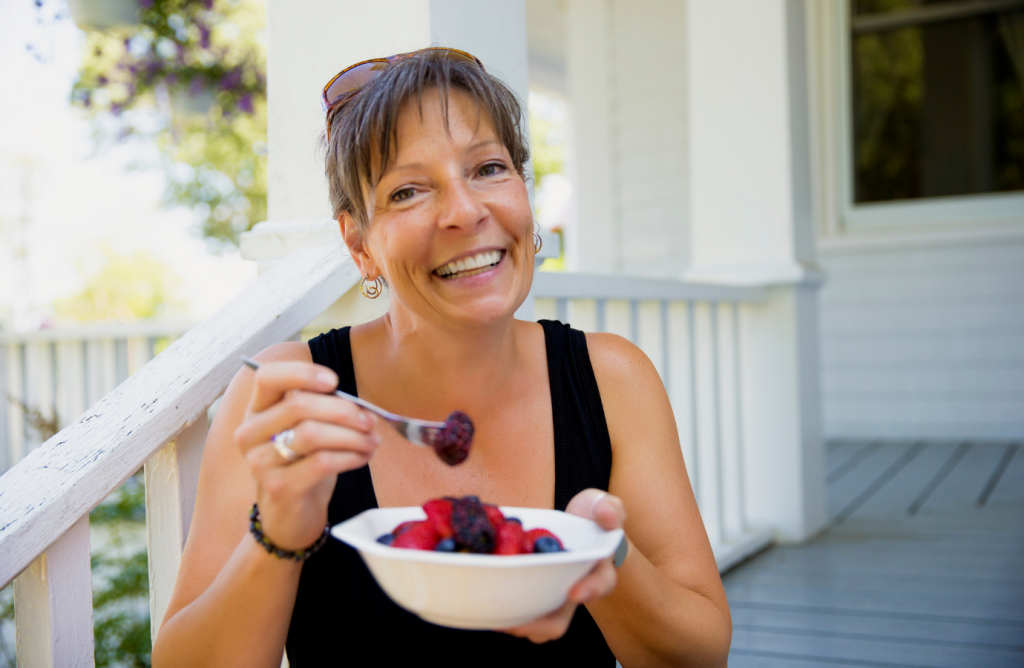
Nutrition is a major influence on your health throughout your life. It’s not just what you eat, but also when you eat, how you eat and how you feel about eating that is important.
When you go through times of change, such as menopause, it is a great time to reassess your nutrition. Are you eating the healthiest diet to meet your body’s changing needs? Are you still enjoying choosing, cooking and eating, or have you become bored after years of cooking for others? Are you eating at the best times of day for your natural rhythms. Are you giving yourself time and space to eat mindfully and digest your food well. Perhaps you have always eaten what your partner/children want to eat, and at times that suit everyone else. Maybe it’s time to suit yourself a bit more? What is it that YOU really need at this time?
Good nutrition can help with menopausal symptoms, helping you to feel more energy, reduce hot flashes, sleep better, and improve your mood. It can even increase your sexual desire and sensitivity.
Healthy eating, combined with exercise, can help to counteract the decline in muscle mass and bone density at menopause.
Many women find that they put on unwanted weight in menopause, especially around the belly. There are many reasons for this: reduced metabolism, declining oestrogen, less physical activity, poor sleep, low mood. Healthy bodies come in all shapes and sizes and maybe you can learn to love this softer version of yourself? However, excessive weight gain can put you at increased risk of heart disease or diabetes.
Place your focus on creating the healthiest diet possible for yourself, including fresh vegetables and fruits, wholegrains, high-quality protein, beans and pulses, nuts and seeds, superfoods, supplements as needed and treats in moderation. Educate yourself about what foods will best support your bone and muscle health, which foods will reduce any uncomfortable symptoms you might be experiencing, and which foods will help you to feel alert, focused and full of energy.
What Does Ayurveda Say About Menopause?

According to Ayurveda, we are influenced by three different energies called doshas known as vata, pitta and kapha.
Vata energy is cold, light, dry and rough. It is primarily an energy of movement. Vata governs all movement in the body: the joints, respiratory system, circulatory system, excretion, and all functions of the nervous system. Vata types tend to be energetic, quick-thinking, intelligent and creative. They love excitement, ideas and conversation. Their energy comes in bursts, and it’s easy for them to get stressed and overwhelmed.
Pitta energy is hot, fluid, viscous and penetrating. It is primarily an energy of metabolism. Pitta governs appetite, thirst, digestion, metabolism, heat regulation, pigmentation and vision. Pitta types tend to be strong and capable, have good endurance and can work hard for their goals. They love activity and achievement, although it’s easy for them to push themselves too hard and burn out.
Kapha energy is heavy, cool, wet, soft, dense and static. It is primarily an energy of structure and stability. In the body, kapha governs formation, growth and development, strength, immunity, lubrication and fertility. Kapha types tend to be affectionate and compassionate, good listeners and naturally the most loving of the doshas. Kaphas have good stamina and the ability to get things done, although their naturally slow and calm nature means they have to discipline themselves to get up off the couch.
We all have all three of these energies in us, but everyone is born with different amounts of each. This is our constitution or prakriti and is what makes us unique. By understanding our personal prakriti we can learn how to better accept and love ourselves, and also how to live in a way that supports more balance.
The doshas also govern different stages of life: kapha is dominant from birth to puberty, pitta governs puberty until mid-life, and vata becomes more influential after 50. No matter what your personal dosha is, you will also be more influenced by the dominant dosha of your current life stage.
Menopause is the transition from the pitta to the vata stage of life. During this stage you may experience imbalances in either pitta (eg excess heat, mood swings, irritability) or vata (eg dryness, increased mental activity, anxiety).
You can bring more balance by focusing on foods that help to pacify vata and pitta, doing exercise to relax the nervous system and creating calming routines around sleep, mealtimes, work and leisure. Ayurvedic treatment also included herbs, oils and healing practices such as massage.
What Does Chinese Medicine Say About Menopause?
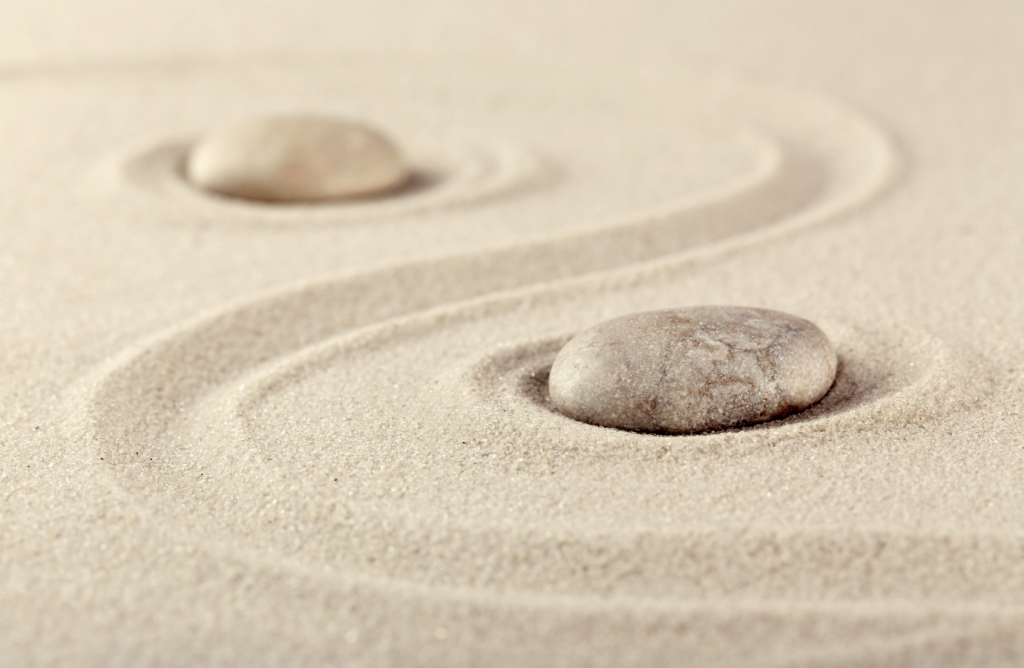
Yin and Yang are are complementary energies present in everything and everyone, and balance between them is essential to maintain optimum health. Yin is the feminine essence, which is characterised by the qualities of cool, soft, dark, moist and quiet. Yang is the masculine essence, hot, hard, bright, dry and expressive.
A common pattern for women at menopause is having a deficiency of Yin energy, and an excess of Yang. Years of working in corporate, characterised by ambition and achievement causes women to think and behave in overly Yang ways. Caring for others, perhaps at the expense of meeting our own needs well, can also deplete Yin energy. Stress and worry also drain Yin energy.
Symptoms of Yin Deficiency / Yang Excess – Sounds a Lot Like Menopause…
- Night sweats
- Hot flashes
- Sweating
- Insomnia
- Dizziness
- Tinnitus
- Irritability
- Headache
- Constipation
- Vaginal dryness
- Dry mouth, skin and hair
Yoga, Qigong, Breathwork and Meditation Can Help Restore Balance
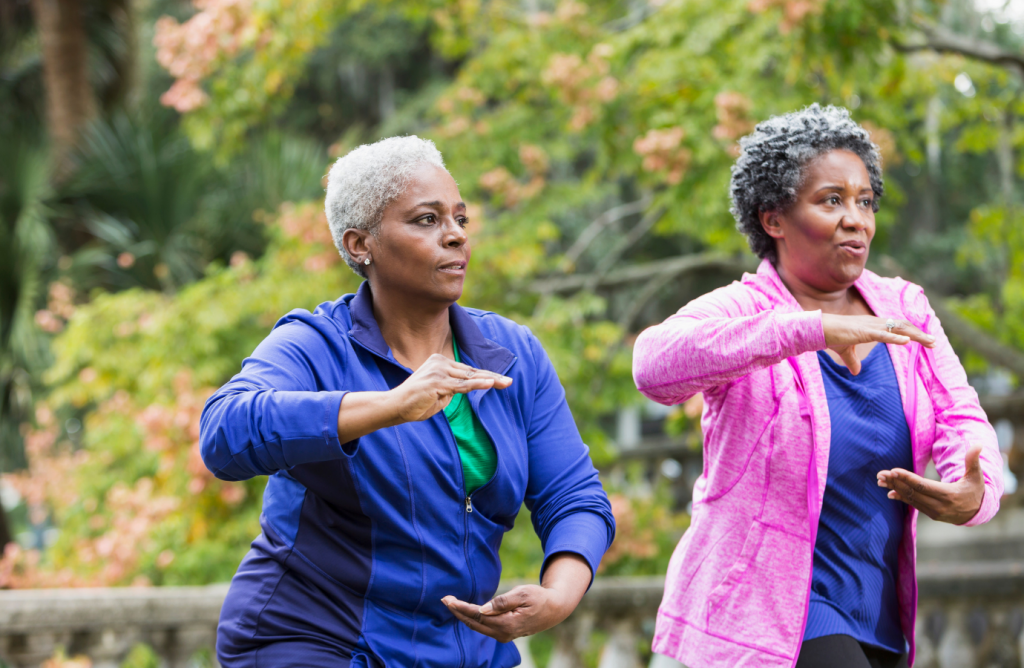
Mindful movement practices such as Qigong and Yoga can help life force energy to flow more easily through the body, balance Yin and Yang, nourish the organs, restore balance to the body, increase energy and alleviate hormonal symptoms.
Yoga is a powerful ally, if practised in a gentle, flowing and mindful way which encourages deep internal awareness, self-enquiry and inner strength.
A Qigong practice can be chosen to strengthen the kidneys, nourish Yin, clear excess heat and harmonise the flow of Qi throughout the body.
Breathwork can be used to calm the nervous system, infuse the body with energy, elevate mood and clear out the cobwebs of the mind.
Meditation slows the mind chatter, restores a sense of empowerment, and brings about a state of profound peace and contentment.
How To Soar Naturally Through Menopause
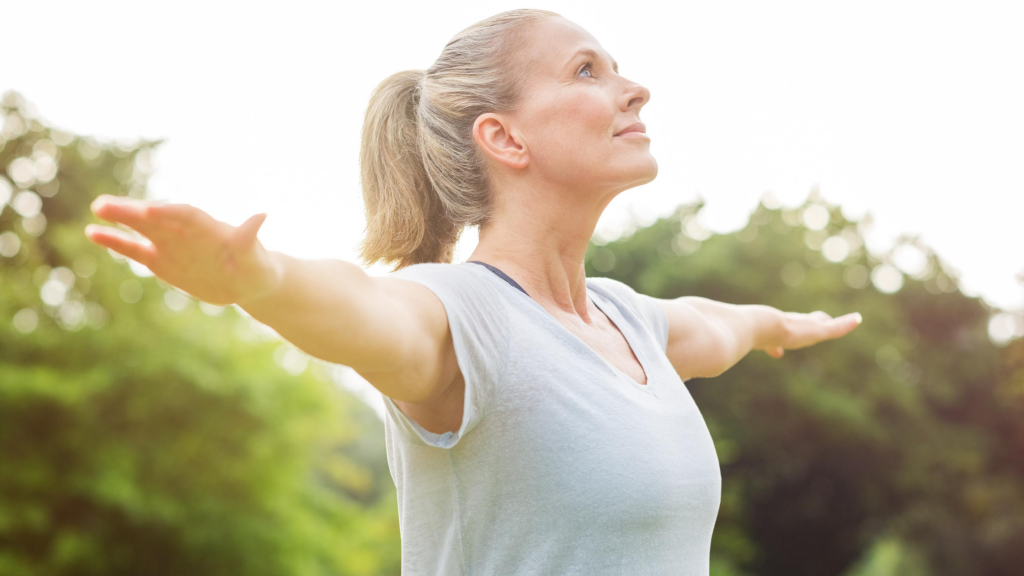
Menopause is perhaps the biggest life change that women have to navigate. It is not an illness that need to be cured. Hormone replacement therapy might be useful for you, but it’s not the pill that will make menopause go away.
Managing menopause naturally means holding up a mirror to yourself and your life and asking some honest questions.
Am I happy with the way my life is going?
Have I been treating my body well?
What do I need to do to take care of myself so that I can soar through the next phase of my life?
Managing menopause naturally means keeping hold of the reins of your life, not handing them over to someone else. You will be your own best healer, because only you know yourself inside out. You know who you are, where you came from, what you are going through and, ultimately, what you need to grow into the best version of you.
Using simple but powerful healing tools of nutrition, movement, and energy-balancing techniques it is possible to create your own tailor-made health care plan to help you soar through menopause into a new, exciting chapter of your life.
Are you overwhelmed with information about menopause? Do you want some help finding the best way for you to manage menopause naturally? Would you like to find out what the natural remedies for hot flashes and vaginal dryness are? Perhaps you are interested in the best supplements for healthy bones?
I would love to be of service. Let’s have a chat to find out if it would be a good idea for us to work together.
We will take a look at where you are now, where you want to be, and what is getting in the way.
If I feel I can help you, I’ll tell you how, and you can ask me any questions you have. If I don’t feel that I’m the right person for you, I’ll tell you that too, and perhaps recommend someone who is a better match for you.
Click the button below to book a call. I look forward to talking with you.
Move Like Water
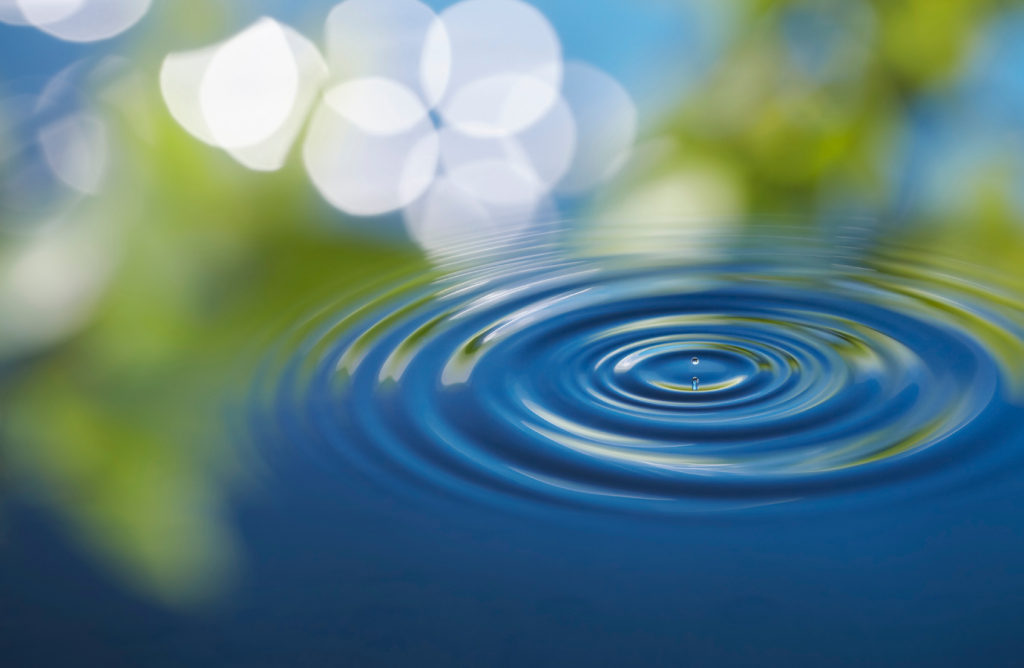
Move Like Water brings together gentle Hatha Yoga, Qigong, Breathwork and Meditation, in a deep and powerful practice to support women through times of change and fluctuation. It can be particularly beneficial to women in perimenopause and menopause, nourishing yin energy and soothing and calming frazzled nervous systems.
In these 5 sessions, you will tap into the spirit of water and nurture these qualities in yourself, fostering the qualities of stillness, flow, persistence and power.
You will move in flowing, stretchy, delicious ways to become more deeply embodied; use meditation and visualisation to strengthen and empower your inner wise woman; play with breath and sound to heighten your intuition and perception; and deeply, deeply rest.
In this course, you will learn how to:
- connect with your fluid body
- calm and focus your mind
- move with ease and flow
- hydrate and mobilise to dissolve resistance, tension and pain.
Click the button below to find out more.






